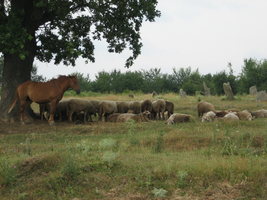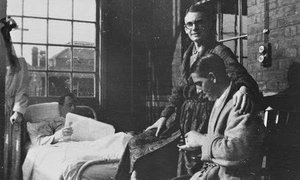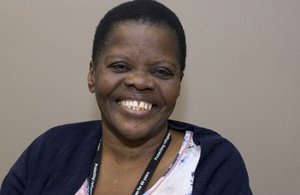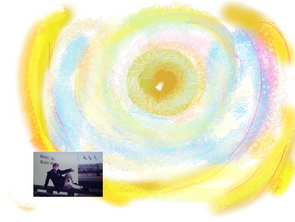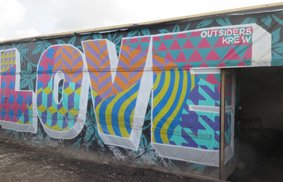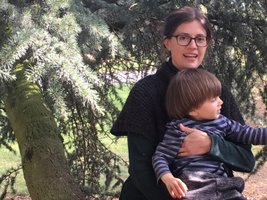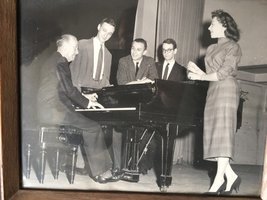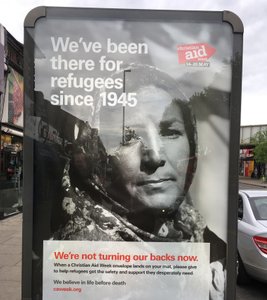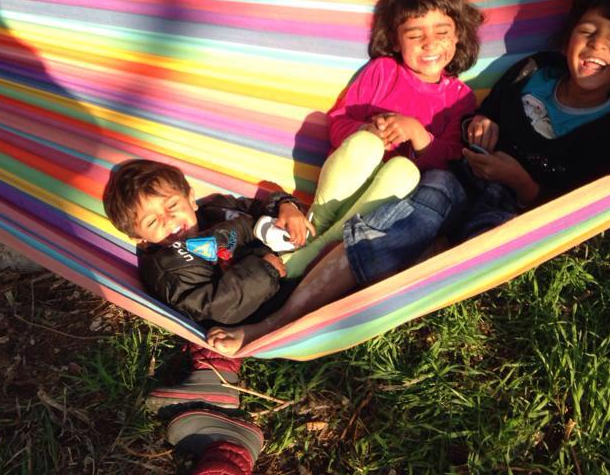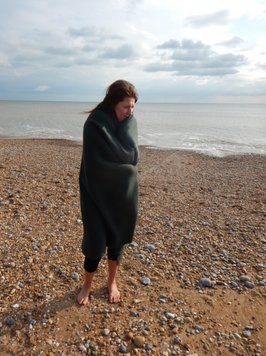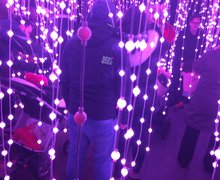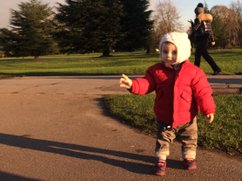Morphe
GrassmarketProjected
Epic Theatre In Berlin
How do you describe the Grassmarket Project theatre company that was the most highly praised of the 1990s, with Sarah Kane, the most performed playwright today, saying it was what caused her to choose to become a theatre writer?
"The lives of the dispossessed are best conveyed if they themselves are brought on-stage to tell their own stories. The results..are the most memorable feature of each Festival.." Paul Taylor wrote in the Guardian. Susan Sarandon wants to be involved.
Morphe is Greek for 'shape of dreams'. They arise in us when we are most languid, lazily tossing around in sleep. Those areas of life we cannot cope with resurface like twinkling stars and here is perhaps the divine in us: we try to find a positive outcome, a wish fulfillment as escape from anxiety. As Francis Crick, Nobel winner, conceived, we let the wriggling worms escape, which he compared to electrical grids in research, mirrors of our need to forget.
There balance is found in how much we can change and how much is useful, or useless suffering. Filtering these extremes has always been theatrical tautology: what we raise from collective unconscious, or the morphing and 'shaping of dreams' became a central part of Greek society. Like potters at the wheel we design and redesign, put water on to smooth what is lumpy. So it is most curious and telling that a Professor Schumacher, who knew Brecht, came to speak after watching Grassmarket Project's homeless on Berlin's and Europe's most famous, experimental stage . "This is the fulfillment of what Brecht's Epic theatre aimed at." As the lead dramaturg, Sabine Zielke, also put it: "The homeless understand dialectics instinctively."
No company has changed European and worldwide theatre landscapes more drastically and dramatically than Grassmarket/ Grassmarket Projected, Absolute Theatre and associated Scotland Street's small press, publishing plays and testimonies of women.
It is a contention that atonement is what theatre often is about as well as wanting change passionately. As women have become more independent they have dared to reach out more profoundly, such as did Sarah Kane, deeply moved by MAD, or Naomi Seekings' performence, among others in it rang so true as to influence Kane's whole life.
Theatre is about finding a voice, although the aristocratic highend actors often realise suddenly to their dismay that it must be everyone who has a voice. So they become engaged citizens, like Vanessa Redgrave and her brother Colin, to name familiar, extreme examples, in supporting those who suffer injustice. Likewise Camus and Sartre in the 'literrature engagee'.
It is a valid contention that atonement is what theatre often seeks, when society is mature enough to reflect on itself. as well as wanting change passionately. As women have become more independent they have dared to reach out more profoundly, such as did Sarah Kane, deeply moved by MAD, GMP's final part of trilogy, Glad Bad Mad. Her interest might reflect Naomi Seekings' performance, among others in it, as it rang so true as to influence Kane's entire future life.
Theatre is present in the giant blowup tents that homeless reside in to stay warm, in Saint Petersburg, as much as in Boal's Brazilian citizen uprisings, or Cardboard Citizens boxes under Waterloo Bridge. Grassmarket Project has assumed its place as an ongoing experiment with community and increasing public engagement, revealing the shock and horror of homelessness, in London, Paris, Dublin, Berlin and Edinburgh, with Absolute Theatre's Shopfront now also in Coventry. These theatremakers include Jean Findlay, Jeremy Weller, Chris O'Connell and Julia Negus, as well as Charlie Wiseman and Nadira Nasser. The shock of facing these performances from the Lower Depths, briefly inspired Nicholas Hytner to invite them to perform Gogol's Classic at the National, but when the homeless from underneath Waterloo Bridge were invited in he quickly withdrew. The undermining of nature as in the Amazon basin has been linked since 2011 to the theatre of Cruelty of Artaud. Theatre can be any performance that invokes the violent madness of the world and is broadening with public protest day by day.
Expressionistic elements, similarities and differences from Tadeusz Kantor, to Frank Castorf's Volksbuehne, with Schiller's 'The Robbers' and 'Public Shaming', to Jean FIndlay's and Jeremy Weller's 'Grassmarket Project' production of Camus' 'The Plague' at the Volksbuehne.
If the whole world is a stage then theatre is a play within a play.
If 'the whole world is a stage' then theatre is a play within a play. To be the only company invited to work at Berlin's Volksbuehne in the first decade after German unity, a theatre where Bert Brecht had begun, assisting Erwin Piskator in what he coined 'epic theatre',
reflected how the work revalidated the stage's working class mission, grasping an elemental bond to the humble, common task of the thorny, harshest, most miserable lives conceivable in society. Since the 1920s Berlin valued such working mens' lives, with cast iron, ancient Victorian beds transported in the GMP van all the way by road from Scotland.
The expressionistic element of a play within a play is reinforced by the appearance of the director on stage. The likes of Tadeusz Kantor had appeared in his own plays, or with a megaphone, Christoph Schlingensieff, and so too in the case of Jeremy Weller's and Jean Findlay's Grassmarket, although a trained actor, Chris O'Connell played them. There is a disturbing seam of absurdist humour inherent in the inability to find out enough to finish a play, which also smacks of Sartre, or Camus, with the process in itself coming under scrutiny. Why are we used to actors playing the lives of real people? As Paul Taylor wrote in August 1992 Jeremy and Jean have "no such luvvy delusions". The actors are so real that Irving Wardle sees other plays in the official selection as giving off the odour of 'museum pieces'. 'Lightening' surely won't 'strike twice', he continues but insists these plays are central to what any thinking person wants to see. You learn as much about yourself as others' he goes on. Like the hit 'The Big Tease' of Jean Findlay the Mad women may be saner than the audience. Both plays toured widely.
It is worth reflecting on the links that Jean, her best friend Lala, and Jeremy have with the East. Much like in Brecht, or earlier even in Doestoevsky's multiple voices and viewpoints, there are elements of expressionistic art. As in Artaud the absurd cruelty of life is fully visible on stage. The purpose of abstract expressionism from the earliest painting career of Tadeusz Kantor demonstrates itself in his interest in the intangible, in deformed figures, which turn into broken umbrellas, embollage, reflecting the absurdist sense of life's purposelessness and revealing a bleakness that similarly manifests a hunger for a spiritual, living art. The real reason Kantor became theatre director is described by fellow artists, as his wish to make art move. Richard Demarco an entrepreneur would invite Kantor to Edinburgh to show the 'Water Hen', the most talked about play in the Ednburgh Festival, which wasn't in the Festival. He also invited 'Glad to be alive' with Edinburgh's homeless to reveal what made them who they were.
A band of brothers came together in Edinburgh, with Kantor, Jim Haynes and Demarco all in search of the intangible which the philosophy of the East combined well with.
It is my thesis that the best work created by directors, actors and companies like the 'Grassmarket Project' broadranging work is that it works with the most generous minded band or company of sisters and brothers that the theatre world ever produced. Rather than seeking attention Jeremy Weller and Jean Findlay went to live in Krakow, in Poland to be close to the man best known for work that echoes Sartre's existential angst and Camus' concept of the emptiness of modern society, Tadeusz Kantor. Plays such as 'The Waterhen' and 'Dead Class' demand the director to appear on stage. A technique Jeremy Weller would also employ later to make work that also sought inspirational answers about the purpose of theatre: is it intended as critical of society? In the West it is mere entertainment, but in the East it dared criticise society and fulfills a role for the artist which have been forgotten or lost. Is Greek drama of no consequence, anymore, or is Sisyphus' myth of a man heaving and shoving a rock over the other side of a hill, so it drops down the other side symbolic of the eternal quest of humanity ?
Is Diogenes, a Cynic who leaves the confines of society in search of a better life?
In the East there is a chance for redemption in purified efforts to face bleakness.
With Jean's and Jeremy's spontaneous visit to Poland, a country decades behind in technology there is a similar rejection of the hegemony of money, which evenshocked Tadeusz Kantor. Considered an oddity as much as he was admired, none had previously considered being his student, and his shock, horror led to his first words of resistence, as Jean Findlay relates, in response to their wish to observe rehearsals"No. No. No."
On one level the East had exactly what Grotowski also prized, a space where one can play and dawdle, and live without any wish or need for involvement in the harsh, outer workings of Eastern communism or Western capitalism. Any interruption to an artist is likely to engender fear and anger, as the sacred space of self discovery is upturned,
Yet pecularly both Jean and Jeremy felt called to reject the rampant commercialism of the West. Jean's closest artist friend, Lala Meredith Vula, an Albanian was drawn to join them later in East Berlin, with Glad to be Alive, a day in the life of a homeless hostel. Yet she also had dabbled in the same Goldsmith exhibition Frieze, with Damien Hirst. The contrast though could not be more extreme: she loved to continue involving herself with Grassmarket, with plays like '14 hamlets' perhaps the best of all Hamlets as it invokes in each lay actor the wish to claim the identity of outsider himself. It was a rather scarily, passionate declaration of love and appreciation of two young unlikely, Western students, taking a sabattical in the East. It was also injected with a brand of humour completely missing in Hirst. Jeremy had started off painting, but like Jean Findlay, who would go on to work with striptease dancers in Edinburgh. They shared a commitment to humans and society. In fact the earliest work of the Grassmarket Project there was a dialectics of contradition, between the lives of 'Glad' homeless, enacted on the street and the transformative showing of their life: the fun of expressing oneself, projecting voices literally and metaphorically, with trained actors identifies their willingness to give up the dissolute life in favour of a fulfilling career of acting, singing and dancing. Wagner's Total Theatre, that influenced Brecht used this as well, when he sang and composed with Weill. (Most of the Scottish of Glad dancing was done mostly in Berlin, Paris, London, Dublin, Edinburgh nightclubs, with those who recognised the courage of the actor/participants on stage to reveal the humour of their lives. There is progression as Irv Wardle described in the Sunday Independent: the victims of breakdowns in Mad 're-enactment of the past forges a drama of present-tense attachments - particularly between the clinical victims and the 'normal' actors.' The process benefitted by the presence of superb acting, such as David Benson, since at the National Theatre and Chris O'Connell, running Coventry's innovative Theatre Absolute, with Julia Negus, who are awarded, foremost voices in a citywide expansion of voice, dance, theatre and improvised drama that led to 'Car', 'Raw' and 'Kid', the first of which is acknowledged as In Yer Face theatre by Aleks Sierz. The experiential theatre admitted the involvement of Berliner Ensemble, Volksbuehne, Berlin, both of which employed Charlie Wiseman as researcher and producer, who interviewed locals and met all those who lost their jobs after unity.. Essentially the paradox lies in the actors supposedly excluded, having actually realised that like Diogenes, they are enjoying enacting lives, more interesting and complete than those of others subjugated to rules in 'normal' Western society.
So the New Theatre as Jean Findlay described it in the Independent was an explosion on stage of ordinary street folk, literally 'Glad to be Alive', as is the complete title of the first play.
Critical reception of Grassmarket Project and comparison with Sarah Kane requires insight into why her work like Grassmarket's was immediately hailed in Germany. There is a need to view her work. .
After arriving in Berlin Charlie Wiseman worked for the Guardian, Evening Standard, as well as advising the BBC on German reunification. Being given one of many unoccupied flats in the Kollwitz Kiez, where dissidents gravitated, he set about interviewing theatre workers, some of whom suffered a level of abusive, invasive spying. "What made it difficult was the continual sense of being watched, as surveillance techniques and the taping and bugging of conversation was so widespread. People would gather in Kollwitz Square to talk openly, as they knew they could not be taped there. The work in Berlin dealt with raw emotions, the disappointment of a fairer system failing to take hold. While in East Germany the judges, for example, who had collaborated with the Nazi regime had been imprisoned, in West Germany they had been allowed to return to work as normal. This Eastern purification was labelled as Year Zero. The likes for example of dissident voice, Walfriede Schmitt, would immediately take up support of Edinburgh's homeless and together with Sabine Zielke, a young dramatist, since associate director, Bert Neumann, celebrated stage designer and Frank Castorf offer a huge welcoming reception, with all tables in the People's Stage canteen laid out with delicious fare and drinks. The homeless from Edinburgh were as gratified, as amazed to see themselves welcomed so wholeheartedly. In Edinburgh they were eccentric outsiders, sympathised with, but never platformed by state theatres. In Berlin by contrast, with its historical geographical role, as multicultural centre for alternatives, as Christopher Isherwood related, in his Berlin classic, made into 'Cabaret' 'money' did not define anyone. It was 'to be borrowed'. There were also countless refugees, nearly half a million from Russia, in the Twenties. after Revolution. Later these were added to with Vietnamese, in the East cultural exchanges with Africa and further afield meant that universities in East Berlin, or Moscow were safe havens. The level of racism in the West was not visible at all, as severe penalties such as prison sentences were administered to any who considered themselves 'more equal' than others.
In West Berlin, an island in the East of Germany's Democratic Republic, there was a much vaunted attempt to keep up, by allowing those who refused military service to come live here. The Western Sector of the city was underpopulated as those who were more conventional felt a wish to be back in a country that allowed travel, through more than a Korridor/corridor by train to the rest of West Germany. The alternatives gravitated to West Berlin, artists, musicians, writers sympathetic also with the policies of Eastern Europe to deal with fascism. A deep desire for rehabilitation led to the extremes of Bader Meinhof, the younger generation who felt the West had not atoned sufficiently for its past. The artists who appeared were varied and unexpected: David Bowie, moved to Charlottenburg, a safe, middle class haven, in West Berlin, as he also commented on the fact that he was not recognised or even if he was the artistic community were too occupied with their own development to care who he was. The shift of artists also from other parts of East Germany to the capital was much vaunted, on film, as for example, in Heiner Carow's 'Coming Out'. In Berlin people could invest in whoever they felt like being, much as Edinburgh, the other extreme of Europe, where ordinary people mingle with student communities. Support for Turkish labourers after the war, as so much construction was necessary to rebuild the cities, many German men having lost lives, meant that elites were less popular.
The young Sarah Kane, came across Grassmarket Project, as a young woman of twenty, visiting Edinburgh, in 1992, the other cultural hub of Europe. It is often stated that the likes of Italian Scot, Richard Demarco, from Portobello (meaning 'beautiful gateway', symbolically for refugees) and later Professor Jim Haynes who did his American military service in Scotland, would not have found such openness to their conception of an alternative festival anywhere else in Europe. There is transparency to the pursuit of artisic and theatrical careers in cities that are peripheral, as business is not the main, or easiest pursuit. Sarah Kane must have felt at home, as a sensitive, artistic spirit, mingling in the audience of 'Mad', hearing or reading that the company had already conquered Paris Pompidou, Berlin Volksbuehne, both key stages for the left and bizarrely with actual street people, encouraged to be themselves on stage. The invitation to Berlin coincided with the Gulf War and homeless, 'normal' actors and plays she went on to write. Geopolitically speaking there tend to be generational backlashes against those Western centres of Empire, with Berlin, in particular having had the Berlin Conference of 1884, pre‐Orwellian by one hundred years, carving up Africa between European imposters. As a gay or bisexual person, rebelling against the colonial norms of bullying and power structures, Sarah Kane would have felt at ease in Edinburgh, as much as Bowie in Berlin.
Jean Findlay who had been vital in producing all Grassmarket work involved young sex workers,as well in a provocative work 'The Big Tease'. The welcome in Eastern Europe of alternative thinkers also in part resulted from collective disavowal of Europe's past as British French and German Empires.
It is often overlooked by critics of Sarah Kane's expressionisitic work, as she reiterated time and again, that she felt allied to Grassmarket dramatic technique of exposing violence no holds barred. Even if she did not personally meet Julia Negus, Lala Meredith Vula, 'immunised' by their work. She must have felt an overwhelming authenticity, as many did, pervaded out of those witnessing abuse. Those outsiders warring with societal norms, David, Jimmy, Gary from Glad and Bad, and Naomi, Viv, or others from Mad were being themselves. The company differed from her in technique, as she preferred sitting along, at a typewriter.
Jean Findlay, Julia Negus, Lala Meredith Vula all survive in their more stable relationships and openness to those around and working alongside them, in Jean's case publishing alternative women's books, while Julia or Lala teaching when not creating works, at De Montfort, Edinburgh, New York, and London.
Recent diary of events:
Thought for the Day: Smile and you will confuse someone.
April 26th it was becoming clear that we had to face the changes in environment. As if by chance (or not) it was world earth day and I knocked on a couple of doors in Cabul Road, before standing behind the gate with mask: Do you want to help a dried out Memorial Garden? Plants were donated,expense shared, new horizons' exuberance. We started feeding birds and welcoming stories from those who came to the garden since 'granddad locked the gates and opened them every day. Sometimes I went along with him.'
Since we hold painting workshops for children and discuss who feels bereft and how we can help. Recently we transformed the Memorial Garden, with herbs and lavender and invited food sharing from our sponspor Pret, which resulted in some drinkers eating and chatting instead of being alone. The improvement led us to feel more tranquil, as we were active: ecologically active.
CFPeterson and Mona McLeod and JeanFindlay, who wisely points out that we all chase lost time, in her recent talk in New York, as writing down events takes longer than living them, a paradox.
We distribute 200 000 meals yearly,in Uk /support exchange of homeless actors with Berlin, with Pret Charity now offering help there too. Stories of migration are Ray's Cafe Left home of Alexandra Kremakova in Bulgaria, a more natural setting, right mother Laura and Theo Will on bough of an Atlas pine
We like to contrast more natural settings compared with those imposed by refuge, and often squalor, from poverty. Below left CK Scott Moncrieff, facing heavily wounded in the war, before leaving for Rome as closet gay.
Right below Middle Wiseman Snr, Charlie's father with Noel Coward at piano, who sponsored him, as director, when he had heard all Ukrainian farmer relatives had been
murdered. Below left, Jade of Uganda mentored by and now active at 'Freedom from Torture' to highly regarded successful poet. Transformed by Lucy Popescu, now bringing out book anthology of stories about child refugees, to directly challenge the negative press.
is also the title of Voices of conscience another book of Lucy Popescu.
Let us hope we better understand why some children are forced to leave home and a kinder attitude
Wikileaks of Sky We continue distributing to homelessa.Teytour
Missing Al Alvarez in Highgate
We are a better people than those who deny we like immigrants, because the love of Al Alvarez life, Anne, met him in London, and he jettisoned the genteel British poets, calling on Ted Hughes, Sylvia Plath, Seamus Heaney and other moderns, like Cal Lowell in America, who are confessing their love of life and upsetting the status quo.
loose words laura hymers
There is a thing called a poem like a moonbeam held in the palm
gone as soon as it is remembered
There is a memory of whom I once was
before I knew that I was the first time I saw my face in the mirror
There is a mirror, a bright shiny thing that stands between you and I
and cracks as I reach in and cut my hand
There is a scar on my hand from the day I shattered that mirror. Do you remember? It was blue and you said its reflection told lies
There is a mirror that I hold in this scar that is my memory that I give to you here in this poem
The books of Scotland Street Press are now live on the site: dedicated work of Jean Findlay and stunning new adventure thriller by CF Peterson.
Ewan McG: 'wonderful work and challenge to humanity to see where we need understanding and compassion, for those less fortunate.'
Really supporting self-expression is what makes her work fulfilling and worth the journey
Theo People see you and their world slows down
You look through the gap in the bench
Planet, cracked by daybreak of your fox thought
Eyes see a vision of inclusivity: taking inspiration from years with grassmarket project in edinburgh, berlin with the centenary of both the Russian Revolution and the Dadaist Manifesto of Marcel Duchamp, we take it as fact that all share equal rights to express their sense of self,frustration and visions of a better world
empower marginalised through self expression put their words out, print, encourage videos and showing theatre
Unmediated Morphe from Greek 'to find essence in form'
Lyn Gardner in Guardian:
Grassmarket proved that theatre is not just art, it can be a last court of appeal
With the biggest migration of people since the Second World War Europe is facing uncertain times and there is a need to spread a message of cultural understanding. The more we ignore it the more the problem is exacerbated. For example, the building of fires in camps is a carbon disaster, when electricity and water provided would solve problems We make visits to camps also show the resilient
JOIN OUR
NEWSLETTER
WHY
Change starts with creativity
Discipling the mind is always the first step to growing and reflecting
Creative Ideas
Keep people's minds focussed on positive solutions.
Professional Storytelling
It is always about stories, sharing stories which makes sense of life.
Expert Advice
Years of experience mean we are able to offer practical advice and links too
